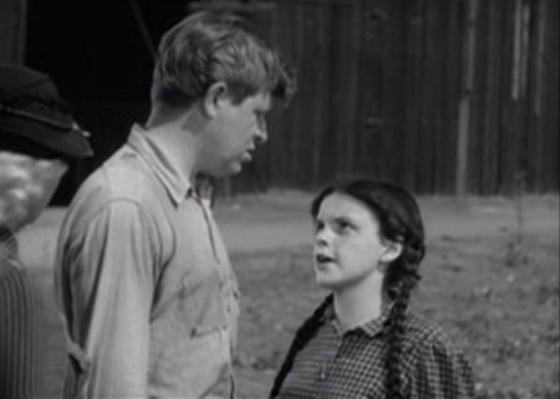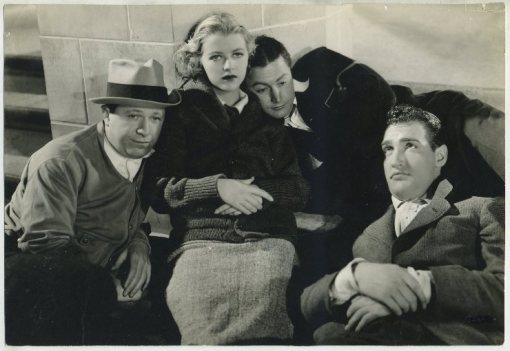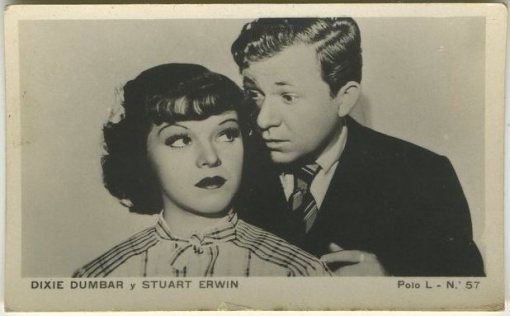 Stuart Erwin was born in Squaw Valley, California, February 14, 1903, the second son of Samuel and Martha Erwin. Stu’s birthday and the nature of the parts he usually played saw him dubbed a “Comic Valentine” early in his career.
Stuart Erwin was born in Squaw Valley, California, February 14, 1903, the second son of Samuel and Martha Erwin. Stu’s birthday and the nature of the parts he usually played saw him dubbed a “Comic Valentine” early in his career.
Erwin’s father operated a 1,200 acre cattle ranch in Squaw Valley that the future actor grew up on. Young Stuart Erwin wanted to be a newspaperman, a part he would play on screen several times, and he majored in journalism while attending the University of California. After a year there he entered a dramatic school in Los Angeles and soon made his stage debut on the West Coast in The Open Gates at the Morosco Theatre in Los Angeles. From there he hitched on with White Collars and spent 48 weeks on tour with the show.
Edward Everett Horton gave Stuart Erwin an early hand and landed him roles in several plays including Beggar on Horseback. It was while playing in Women Go On Forever at the Music Box in Hollywood that Erwin was signed by Fox for his first film role, Mother Knows Best, a 1928 release.
 Erwin quickly developed his own unique style for talking pictures. Looking back in 1936 he said, “When I started out as an actor, I knew I couldn’t hop right into leading man roles. I had to specialize. A comedian by nature, I started to be a fast-talking wisecracker. But I had lots of competition, and saw I had to choose another line. So I picked the other extreme.”
Erwin quickly developed his own unique style for talking pictures. Looking back in 1936 he said, “When I started out as an actor, I knew I couldn’t hop right into leading man roles. I had to specialize. A comedian by nature, I started to be a fast-talking wisecracker. But I had lots of competition, and saw I had to choose another line. So I picked the other extreme.”
Also unique was his voice. As described by Photoplay’s Sara Hamilton in 1932, “It’s just funny. A come-to-Stuie-voice that caresses, that tickles the hearer exactly as if a straw had been waved beneath the nose. A soft, caressing little voice that annoys pleasantly like a feather in one’s ear.”
Hamilton went on to compare Erwin’s most identifiable trait with Dietrich’s legs, Garbo’s eye lashes and Chevalier’s accent.
An early Erwin film vehicle was Dude Ranch (1931). It was notable for providing Stuart Erwin his most important co-star, both on and off-screen in wife June Collyer.
 Collyer, born Dorothea Collyer Heermance in New York City, 1904, was a former Wampas Baby Star of 1928 who successfully transitioned from the silent screen to early talkie roles. She had appeared in The Three Sisters (1930) with Louise Dresser and Joyce Compton and Sweet Kitty Bellairs (1930) with Claudia Dell prior to Dude Ranch, on which she met Erwin. Their marriage came as a Hollywood surprise on July 22, 1931. It would produce two children, Stuart, Jr. and Judy, and, much later, a popular five year run on early television. This Hollywood marriage stuck.
Collyer, born Dorothea Collyer Heermance in New York City, 1904, was a former Wampas Baby Star of 1928 who successfully transitioned from the silent screen to early talkie roles. She had appeared in The Three Sisters (1930) with Louise Dresser and Joyce Compton and Sweet Kitty Bellairs (1930) with Claudia Dell prior to Dude Ranch, on which she met Erwin. Their marriage came as a Hollywood surprise on July 22, 1931. It would produce two children, Stuart, Jr. and Judy, and, much later, a popular five year run on early television. This Hollywood marriage stuck.
Stuart Erwin played in his most famous movie roles throughout the 1930s. Titles you’re likely to have enjoyed him in include Make Me a Star (1932), where his bumbling Merton makes his way to the movies; he’s off to China in International House (1933) with W.C. Fields and socialite Peggy Joyce Hopkins; adoring Jean Harlow in Hold Your Man (1933) with Clark Gable; as a naive movie backer in Going Hollywood (1933) with Bing Crosby and Marion Davies; as Joe Palooka in Palooka with Jimmy Durante and Lupe Velez.
Erwin replaced Lee Tracy in the part of a newspaperman in what he later told journalist Kaspar Monahan was his favorite of his movies (mine too), Viva Villa! (1934) starring Wallace Beery as Pancho Villa. Then, continuing, he appeared with Joan Crawford and Gable again in Chained (1934); as James Cagney’s pal in Howard Hawks’ Ceiling Zero with Pat O’Brien; and bumbled his way to an Oscar nomination as a melon tossing farmboy quarterback in Pigskin Parade (1936).
He was nominated for an Academy Award as Best Supporting Actor for his work in Pigskin Parade (1936) but the 1937 award went to Walter Brennan for Come And Get It (1936). Erwin’s nomination is surprising considering his part is his usual comic bumpkin role–not the sort of part we’re used to seeing nominated. His legacy may have been a bit better served had the nomination come a couple of years earlier for Viva Villa!. Pigskin Parade is fun but would be easy to forget today if it didn’t also mark the feature film debut of Judy Garland.

Erwin with Judy Garland in Pigskin Parade. The blonde hair at the far left belongs to co-star Betty Grable.
Erwin continued in support in big films such as Hollywood Cavalcade (1939) starring Alice Faye; as the milkman, Howie Newsome in Thornton Wilder’s Our Town (1940); and as reporter trying to whisk Bette Davis’ heiress off to the alter in The Bride Came C.O.D. (1941) with James Cagney.
Wife June Collyer had retired from the screen after 1936’s A Face in the Fog, presumably to look after the Erwin family. The Erwins were doing pretty well at the time of the 1940 census which saw a married pair from Finland listed at their address as butler and cook, plus a nursemaid on hand for the children.
Stuart Erwin continued in film work throughout the 1940s playing support for the major studios and a few leads in Poverty Row productions. He also appeared on Broadway with Lillian Gish in Mr. Sycamore. But Stuart Erwin’s most enduring fame was still ahead of him.
Trouble with Father, later retitled The Stu Erwin Show, was an early television sitcom originating out of the Hal Roach Studios in Culver City. The show saw Stuart Erwin play a high school principal named Stu Erwin. His wife June was portrayed by none other than June Collyer, Mrs. Stuart Erwin off the screen since 1931. There were 130 episodes of the popular show over four seasons from 1950-55. The pioneering television show never won any awards but was still running in syndication by the time of Erwin’s death in 1967.
While the show was filmed in Culver City the Erwins preferred to spend their time in June’s native New York. “I know that sounds like treason coming from a home state boy,” said Stu, during a Hollywood interview with Bob Thomas, “but I like it in the East. It’s more invigorating.” The Erwins had taken an apartment on Park Avenue after Stu did a play in New York in 1950 and they decided to keep it. “It’s a grind,” admitted Stu, “but it leaves my Eastern time free. During the year I do other television shows and radio. And during the Summer I can do stage work.”
The Erwins stayed in California a few weeks at a time when they came out to work on their TV show, typically filming 13 half hour episodes before heading back East.
Stuart Erwin kept busy with numerous television guest appearances throughout the remainder of the 1950s and ‘60s and also appeared in a few additional movies. Those included 1963’s Son of Flubber and the following year’s The Misadventures of Merlin Jones.
When a heart attack claimed Stuart Erwin’s life on December 21, 1967 his doctor revealed that the 64-year-old actor had a history of heart trouble. Sadly June Collyer died just a few months later, March 16, 1968, after six days in the hospital with bronchial pneumonia.

Still photo shows Erwin at the left with Betty Furness and Robert Young in The Band Plays On (1934).
While The Stu Erwin Show wasn’t one that I ever ran into growing up in the 1970s and ‘80s, it does survive today on video with several episodes just a click away on YouTube. Definitely worth checking out.
Erwin is a bit too bumbling for my tastes in either International House or Pigskin Parade
, but I liked his character in Make Me A Star
and highly recommend the somewhat more reserved Erwin in Viva Villa!
Works Cited
- Hamilton, Sara. “It’s The Way He Says It.” Photoplay Oct 1932: 60. Media History Digital Library. Web. 14 Feb 2013.
- Monahan, Kaspar. “Last Salutes To Whiteman and Stu Erwin.” Pittsburgh Press 12 Jan 1968: 11. Google News. Web. 14 Feb 2013.
- “Stuart Erwin Finds It Smart to Act ‘Dumb’.” Leader-Post 26 Sep 1936: 7. Google News. Web. 14 Feb 2013.
- Thomas, Bob. “Stuart Erwins Prefer East to Hollywood.” Daytona Beach Morning Journal 17 Feb 1951: 4. Google News. Web. 14 Feb 2013.
- “United States Census, 1940,” index and images, FamilySearch (https://familysearch.org/pal:/MM9.1.1/K974-2DR : accessed 14 Feb 2013), Stuart P Erwin, Tract 381, Beverly Hills, Beverly Hills Judicial Township, Los Angeles, California, United States; citing enumeration district (ED) 19-39, sheet 63A, family 224, NARA digital publication T627, roll 221.
[phpbaysidebar title=”The Erwins on eBay” keywords=”Stuart Erwin,Stu Erwin,June Collyer” num=”5″ siteid=”1″ category=”45100″ sort=”EndTimeSoonest” minprice=”29″ maxprice=”599″ id=”2″]
[phpbay keywords=”Stuart Erwin” num=”4″ siteid=”1″ sortorder=”EndTimeSoonest” minprice=”29″ maxprice=”399″ templatename=”columns” columns=”2″]










Very interesting to read this – I haven’t seen much of Erwin’s work but like him a lot in Ceiling Zero.
Thanks for reading. He can go a bit over the top for me in some things, but I find him extremely likable when he scales it back a little. If you happen to like ’50s sitcoms I definitely recommend clicking over to that YouTube channel I link too. I’ve gotten a big kick out of the few episodes of his show that I’ve watched so far.
remember fondly Erwin in Trouble With Father, the old tv show.